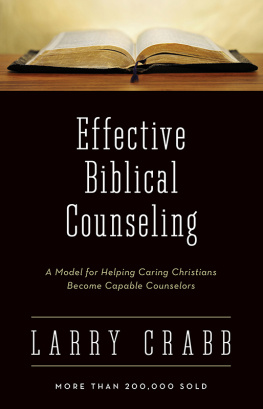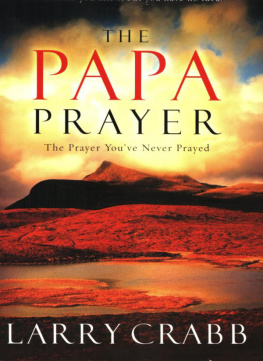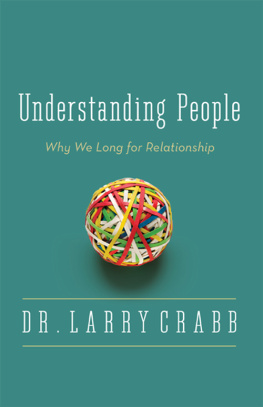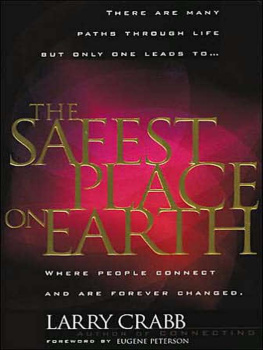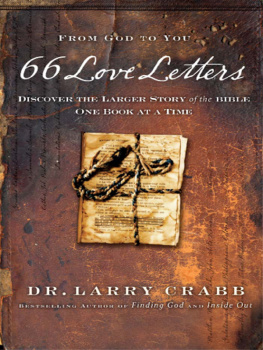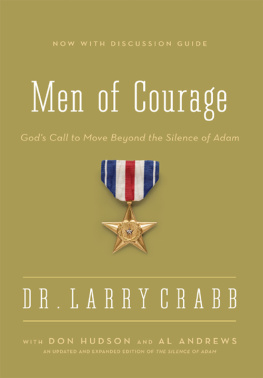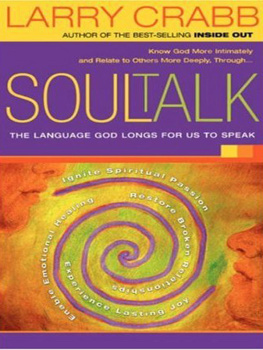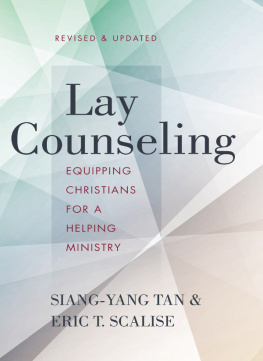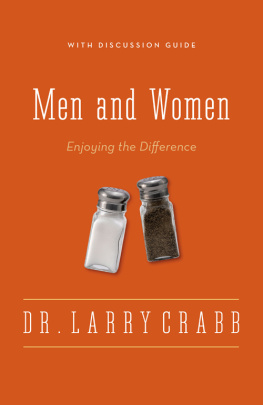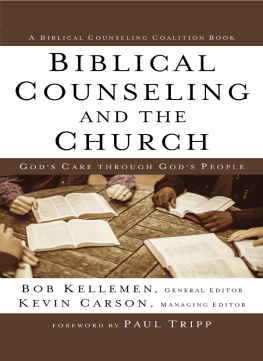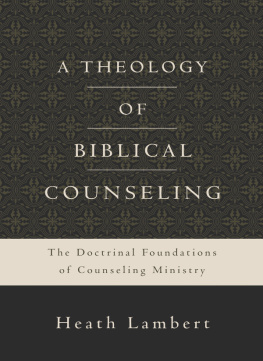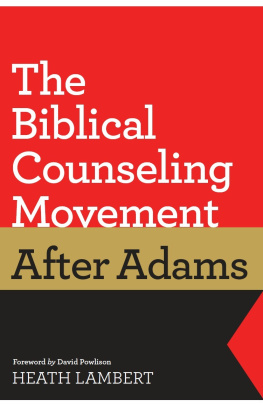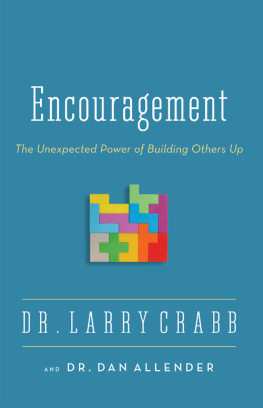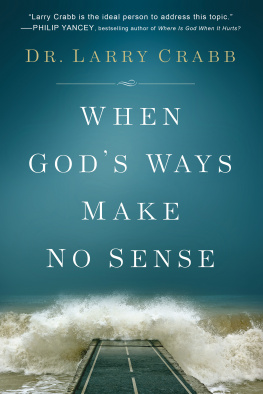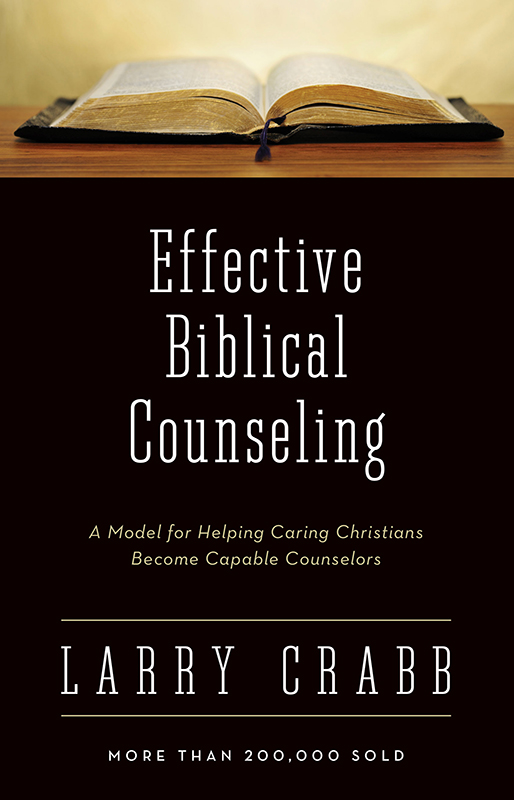
Also by Dr. Crabb
Basic Principles of Biblical Counseling
Encouragement
Finding God
Hope When Youre Hurting
The Marriage Builder
Men & Women
Men of Courage (with Don Hudson and Al Andrews)
Silence of Adam
Understanding People
Effective Biblical Counseling
Larry Crabb

ZONDERVAN
Effective Biblical Counseling
Copyright 1977, 2013 by Lawrence J. Crabb Jr.
Requests for information should be addressed to:
Zondervan, Grand Rapids, Michigan 49546
Library of Congress Cataloging-in-Publication Data
Crabb, Lawrence J.
Effective biblical counseling
ePub edition September 2014: ISBN 978-0-310-51588-3
1. ChristianityPsychology. 2. Counseling. I. Title.
BR110.C76 253.5 77-2146
All Scripture quotations, unless otherwise indicated, are taken from the King James Version of the Bible.
Scripture quotations marked NASB are from the New American Standard Bible. Copyright 1960, 1962, 1963, 1968, 1971, 1972, 1973, 1975, 1977, 1995 by The Lockman Foundation.
References marked ERV are from the Easy-to-Read Version, copyright 2006 by World Bible Translation Center.
Any Internet addresses (websites, blogs, etc.) and telephone numbers in this book are offered as a resource. They are not intended in any way to be or imply an endorsement by Zondervan, nor does Zondervan vouch for the content of these sites and numbers for the life of this book.
All rights reserved. No part of this publication may be reproduced, stored in a retrieval system, or transmitted in any form or by any meanselectronic, mechanical, photocopy, recording, or any otherexcept for brief quotations in printed reviews, without the prior permission of the publisher.
Published in association with Yates & Yates, www.yates2.com.
To Rachael
Contents
Thank you for purchasing the HarperCollins Christian Publishing eBook version of Effective Biblical Counseling.
What is the difference between an eBook and a print book?
eBook versions contain all of the content and supplementary materials found in the original print versions and are optimized for navigation in the various apps and devices used for display. eReaders recognize text as one fluid string and are formatted in a single column. eReaders currently do not support the more complex layout seen in print version books. Therefore, some content may not appear in the same place as in the original print version, but it is structured consistently and uses hyperlinks to navigate between related content.
How do I use the eBook Table of Contents?
*Important Note: Be sure to consult your device manufacturers Users Guide for device-specific navigation instructions.*
The is the primary navigation anchor to quickly access various parts of the eBook. It is generally formatted in the same order as the original print version and is hyperlinked as follows:
Selecting an entry in the .
How do I navigate the content?
The eBook version of Effective Biblical Counseling includes as well as the main book text.
are hyperlinked directly to the content-specific location in the main text.
Select the hyperlinked entry in the to go to its location in the main text.
Select the hyperlinked entry in the main text to go back to the article or list in the or use the devices Back button or function to go back to the last selection.
Footnotes are marked with small, hyperlinked numbers 1 to access comments and citations.
Select the hyperlinked number in the main text to the corresponding footnote.
Select the hyperlinked number to the left of the footnote to go back to the main text or use the devices Back button or function to go back to the last selection.
entries are hyperlinked directly to the content-specific location in the main text.
Select the .
Use the devices Next Page/Previous Page button or function to scroll through the entries.
Select the hyperlinked Chart 1 located below the chart to go directly to the citation in the main text.
Use the devices Back button or function to go back to the last selection.
I wrote Effective Biblical Counseling when I was thirty-two years old. I am now sixty-eight. Some things have changed. Some have not. What hasnt changed is the foundation of core convictions on which I am continuing to develop my understanding of counseling. Those convictions were tested years ago and continue to be tested today.
When I began graduate school in 1965, I scrapped everything I had claimed to believe about Christianity. Looking back on my growing up years in a strong Christian home with two good and godly parents, I wondered if my faith was more inherited than thought through and personally embraced. None of my professors in the clinical psychology program were religious, let alone Christian. To them, Christianity was at best a crutch, at worst a joke.
The time had come. I entered a season (not knowing when or if it would end) in which I believed nothing, doubted everything, and opened myself to anything. It was a frightening and exhilarating time. My journey back (ahead?) to faith was bumpy and dark. Much of the light that guided me was provided by Francis Schaeffer and C. S. Lewis through their many books. I devoured them all.
A foundation of belief was slowly formed. Five core convictions took shape.
Conviction #1: There is a God. He is a person that I can know. He is a community of three persons with whom I can relate. If this is true, then life revolves around knowing God and relating with each person in the community of God.
Conviction #2: We have a problem. No problem we may ever encounter is more serious than our stubborn refusal to turn to God for the life we were designed to live, our rebellious determination to find love and meaning apart from him.
Conviction #3: The Bible is true. The Holy Spirit saw to it that the authors who wrote the sixty-six books said everything necessary for us to know God and relate with the three divine persons.
Conviction #4: The insights of psychology are never sufficient to lead us into the life we most long to enjoy. Psychological research and theory can provoke good thought but must never be allowed to serve as a Christian counselors final authority. General revelation (including what can be learned through psychology) does not have equal value with special revelation (what God has made known in the Bible).
Conviction #5: Our deepest problem, the one beneath what we call psychological problems, is most effectively addressed within Christian community. The kind of relationships made possible by Jesus, not the counseling techniques developed by psychology, provide what is needed for people to change in the ways God most wants us to change.
These five convictions form the foundation for the understanding of counseling that is presented in this book. It is true, of course, that in the nearly forty years since I wrote it, my thinking has moved beyond what I understood then. But it is also true that each of these convictions continues to shape my ongoing efforts to find in the Bible everything we need to know to live life as it was meant to be lived.
To those who want to think deeply about what it means to counsel biblically, to those who long to live the life that only Jesus makes possible, to those who believe that life is all about relationship with God and others, I offer
Next page
